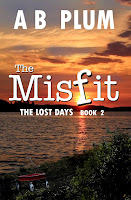Entering a Time Capsule
 |
|
AB Plum lives and writes in Silicon Valley, where time runs at a break-neck pace. Her latest book The Lost Years becomes available on Amazon on March 17–which will be here before she blinks.
|
 |
|
AB Plum lives and writes in Silicon Valley, where time runs at a break-neck pace. Her latest book The Lost Years becomes available on Amazon on March 17–which will be here before she blinks.
|
By Kimberly Jayne
Flying with Mary Poppins by Debra H. Goldstein
Last night, I saw a community production of Mary Poppins that blew my socks off. I can’t say enough about the acting, singing, dancing, or sets, but it was during the instances when Mary Poppins took flight that I felt a surge of “practically perfect” happiness. The only thing that made me fly higher was watching the face of a four-year-old child sitting in the row in front of me.
The little girl was the youngest of three sisters. Seated in the third row, directly behind the family, I was concerned when I realized her parents placed her between her sisters rather than next to them. Was she the buffer to keep the older children from fighting? How could the parents possibly reach and control her if she became bored?
I had my answer during the overture when she crawled over one sister and plopped into her mother’s lap. For the remainder of the performance, she quietly was shuffled between her mother and father. In the comfort of their arms, her attention was glued to the stage for the first act, but she became restless after intermission. That is, until she sensed the actress playing Mary Poppins positioning herself on the edge of the stage, in the semi-darkness, a few feet from our seats. A moment later, when a now spotlighted Mary Poppins rose and flew over the audience – pausing for a second to smile down from directly above the little girl’s seat – the child’s eyes grew wide with wonder, awe, and the making of a permanent memory for both of us.
Hopefully, she will always remember the night she saw Mary Poppins fly. May I, as a writer, cling to the memory of how a child became engaged by the magic of storytelling.
